
Physiotherapy for kids and teens
Kids just want to have fun! What to do when running around and having fun isn’t easy?
Does your child struggle with the fundamental movement skills needed for play and life? We believe that all children can enjoy exercise and sports, some just need a bit of extra help!
Kids learn best when they are excited about what they are doing. So, if your kid wants to run faster or be able to play soccer with their friends, that is what we work on together.
Your child can learn in our paediatric gym and/or at home with you. We will help your child to build confidence in their body and themselves. We connect with you and important people for your child, like teachers, other practitioners and sports coaches.
What to expect from your first appointment
We start with a comprehensive assessment to determine your child’s needs. Parents know their kids best and so we work with you to discover your child’s needs.
For kids with movement issues we often use the Movement ABC-2 assessment which kids find fun! It tells us the level of your child’s gross motor and fine motor skills compared to others and gives us clear information on where to start. Sometimes kids are anxious, have sensory issues or just don’t enjoy sport or PE. We work with kids at all levels, making them feel safe and ensuring they have fun.
For kids with injuries we look at how they use their body and what they are doing with their sports. Kids are not just little adults, there are specific conditions that only affect kids. We find out what is happening for them.


Kids and Sport
Are your kids or teens already enjoying their sport but have had an injury? Do you want to do the best by them and make sure their injury resolves fully? 50% of kids who participate in activities which require running and jumping will sustain a lower limb injury at some point.
Osgood Schlatters and Severs are common conditions that affect sporty kids who haven’t had an injury. We help them to build appropriate strength and manage their sporting load to resolve or at least manage these issues.
Our paediatric team love helping active kids to manage their injury and get them safely back to what they love, whether it’s on the court, ground, pitch, trail or into the water. We go a step further and assess and give strategies to reduce the risk of injury in the future.
Hypermobility
Hypermobility can be normal in small children, but if there is hypermobility in your family you know that it can present challenges for everyday life. Bendy fingers can find it difficult to control a pencil. Bendy knees can make it hard to know where you are in space (proprioception). Coordination challenges and difficulty with running, throwing, catching and balance are common. Of course, dislocations and subluxations produce significant challenges.
We help your family to clarify your priorities. We can trial pencil grips which can make a huge difference – handy if you are on an OT waitlist. We will help your children to safely explore their limits and build their confidence in their body while protecting their joints. We can provide strategies, bracing and advice to prevent dislocations. We will help them to safely develop the Fundamental Movement Skills needed for life.
There is nothing we love more than seeing children lose their fear of movement and exercise and instead develop a joyful relationship with activity as their confidence in their body deepens.


What conditions can physio help with?
- Developmental Coordination Disorder
- Hypermobility
- Neurodiversity
- Autism Spectrum Disorder (ASD)
- ADHD
- Osgood Schlatters
- Severs
- Sports Injuries
- Posture
- Muscle tightness
We work together with you to assist your child to build their skills in a way that is meaningful to them
are you ready to improve your health?
Choose your physiotherapist
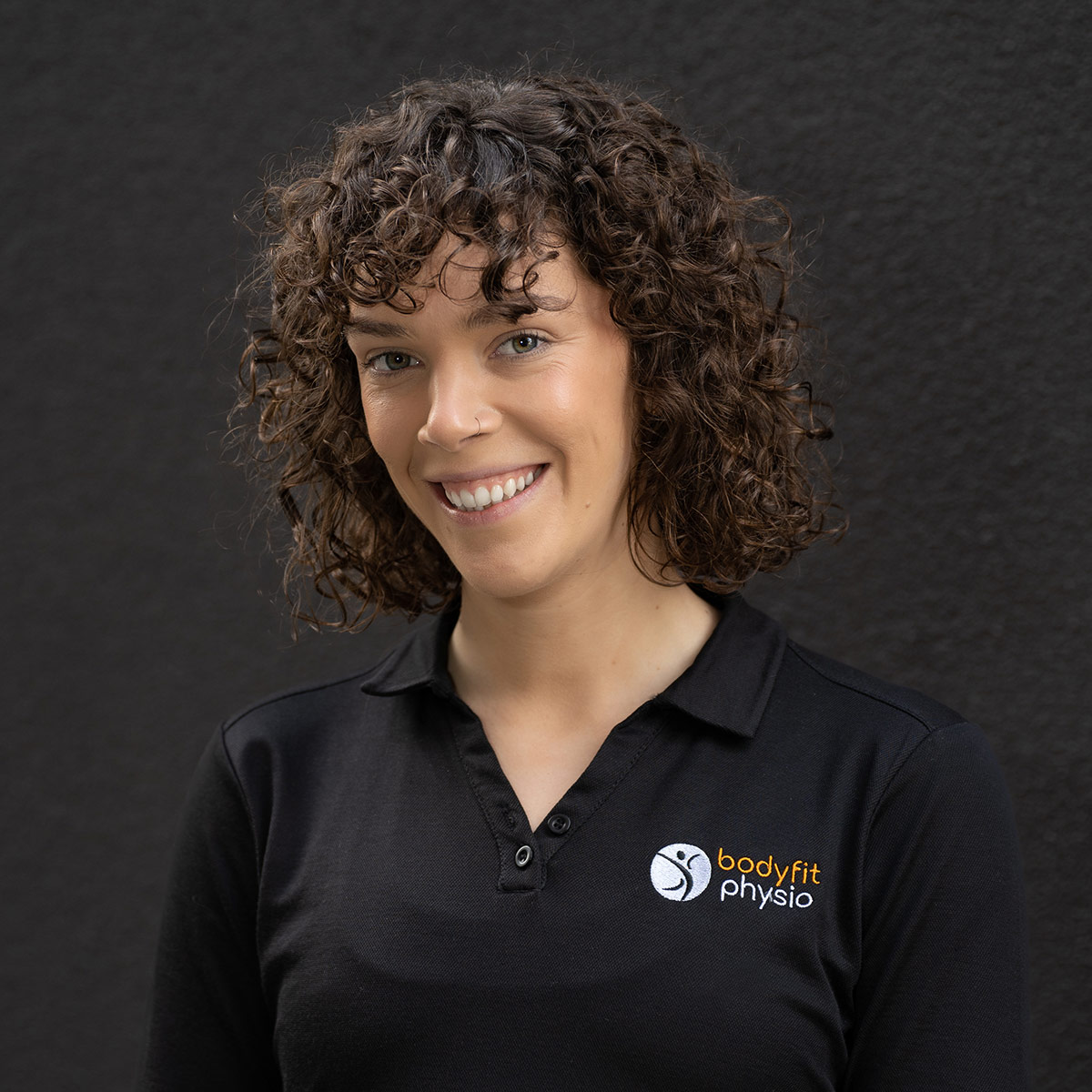
Hilary McAdam (she/her)
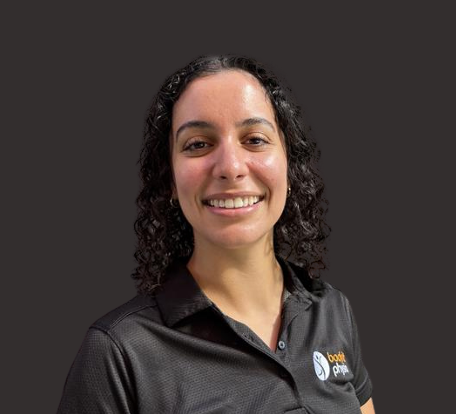
Olivia Ganci (she/her)
BBMed MPhysioPrac
Paediatrics, Lower Limb injuries, Falls and Balance, General physio
Paediatric Blog
Easter Running Club
Kids can get active these school holidays by joining our one-hour running camp, led by one of our physiotherapists. All skill levels are catered for and we provide the practice and guidance to make running more fun.Running skills session in Clifton HillMonday 14,...
Developmental delay
Physiotherapy plays a crucial role in managing your child's developmental delay. Identifying and addressing the areas of challenge helps children to develop the confidence and skills they need to thrive. What to do if you have concerns about your baby’s...
Why does my baby’s head look flat?
It is not uncommon for newborns to have “unusually” shaped heads – most of the time this resolves by 6 weeks after birth. What is plagiocephaly? Plagiocephaly refers to a misshapen, flat or asymmetrical head shape. When babies are born, the joints of their head are...
frequently asked questions
do I need a referral for physiotherapy?
No referral is needed for Physiotherapy. GPs frequently recommend physiotherapy, but a referral is not needed unless you are receiving funding under a GP management plan, GPMP (or Team Care Arrangement, previously known as an EPC). See the next answer for more details about the GPMP.
what should I expect in a physiotherapy assessment?
The first question we ask is “What are your aims for physiotherapy?”
We want to work with you in a way that is most helpful for you. Your physiotherapist will take a detailed history, asking you a number of questions about what has been happening for you. They will conduct a thorough assessment of your joints, posture, strength and any specific activities and movements that are relevant to your issue.
Common management approaches we use:
- Problem solving around how to best manage your symptoms / issues
- Sharing exercises that you can do at home so that you can help yourself
- Hands on treatment to improve your symptoms and mobility
- Supervised specially tailored exercise with our Pilates equipment to help you build specific strength in a supported environment if you and your physio think this would be helpful for you.
is physiotherapy covered under medicare?
Physiotherapy is only covered under Medicare under a GP management plan, GPMP (or Team Care Arrangement, previously known as an EPC). This is a specific program for people who have a chronic and complex medical condition. It provides a rebate of $57 for up to 5 sessions total per calendar year for allied health services such as Physiotherapy, Dietetics, Podiatry and more. Your GP can tell you if you are eligible for the plan. We have limited bulk billing appointments available for concession card holders.
can I use my private health insurance?
The majority of our clients are privately funded. Many have private health insurance which can be claimed on the spot with our HICAPS terminal.
can I access physio under NDIS, workcover, TAC, DVA
Yes we are able to bill directly for NDIS, Workcover, TAC, DVA.
what should I bring with me / wear
It is helpful for you to bring any relevant letters or reports regarding your issue or investigations you have had done.
Ideally wear clothes that allow you to move and allow the body part you would like addressed to be seen. We have shorts available in case you forget. Avoid dresses for low back pain, collars for neck pain and jeans for knee pain.
If you have a foot or running issue, please bring your usual shoes.
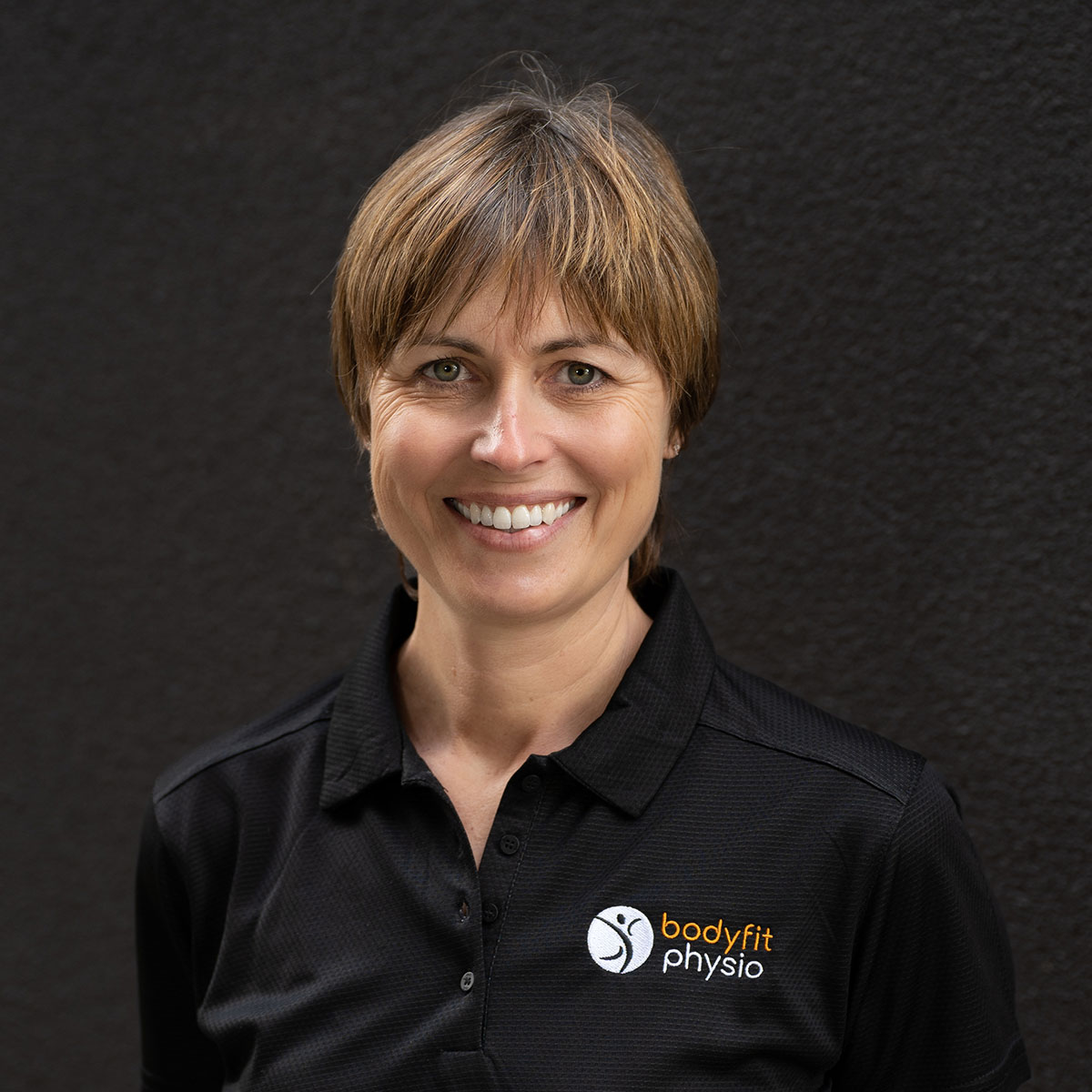
CLINICAL INTERESTS
- Gross motor skills delay
- Developmental Coordination Disorder (DCD)
- Developmental delay
- Hypermobility
Kate Cowlishaw (she/her)
Physiotherapist
Kate graduated with Honours from The University of Melbourne School of Physiotherapy in 1997. She is a highly experienced physiotherapist in movement analysis and creating and teaching individualised exercise programs, addressing a variety of specific needs.
At Bodyfit Physio, Kate works with paediatric clients, primarily between the ages of 4 and 13. She assesses and manages issues with coordination, motor planning, strength, joint mobility, and balance. Kate also works with children on sports specific skills such as basketball, bike riding and running. She has a specific interest in movement issues in kids with Development Coordination Disorder (DCD), Autism Spectrum Disorder (ASD) and Attention Deficit Hyperactivity Disorder (ADHD).
Following a detailed initial assessment, Kate discusses goals with children and parents. She then works with the families and children to decide on the best treatment approach. This can be a home-based exercise/activity program, weekly exercise sessions guided by Kate with some home exercises in between, and/or working outdoors with children to address their sport specific goals. Kate uses the CO-OP approach to help children with coordination challenges achieve their functional goals. This approach focuses on helping children to choose their own goals, then guiding them to problem solve the movement solutions to achieve those goals. CO-OP is an extremely child driven and rewarding approach to learning motor skills.
Kate believes that all children can enjoy and participate in exercise and sports, some just need a bit of extra help! All sessions are fun, with a strong emphasis on building each child’s physical self- confidence. Kate has 2 teenage children of her own, and in her spare time enjoys travel, tennis and walking her dog.

Sana Atik (she/her)
B Physio
Sana graduated with a Bachelor of Physiotherapy from Australian Catholic University in Brisbane. She is a dedicated physiotherapist with a passion for holistic healthcare.
Prior to physiotherapy, Sana built a decade-long foundation in the wellness field, working as a qualified massage therapist, yoga teacher and Pilates instructor. This diverse experience has shaped Sana’s comprehensive, integrative approach to physiotherapy, combining manual therapy, exercise prescription, Pilates, breathwork, and yoga restorative practices to meet the unique needs of each individual.
Sana has also worked in both acute and rehabilitation settings, where she managed and treated a wide range of complex and general conditions including orthopaedic, spinal, cardiac, neurological, reconditioning and chronic conditions.
Sana is passionate about treating musculoskeletal injuries, rehabilitation, pre- and post-operative care, chronic illness management, and hypermobility. She is deeply committed to supporting clients through every stage of their recovery journey.
Outside of the clinic, Sana enjoys going to the gym, practicing yoga, exploring nature, learning Italian and spending quality time with family and friends.
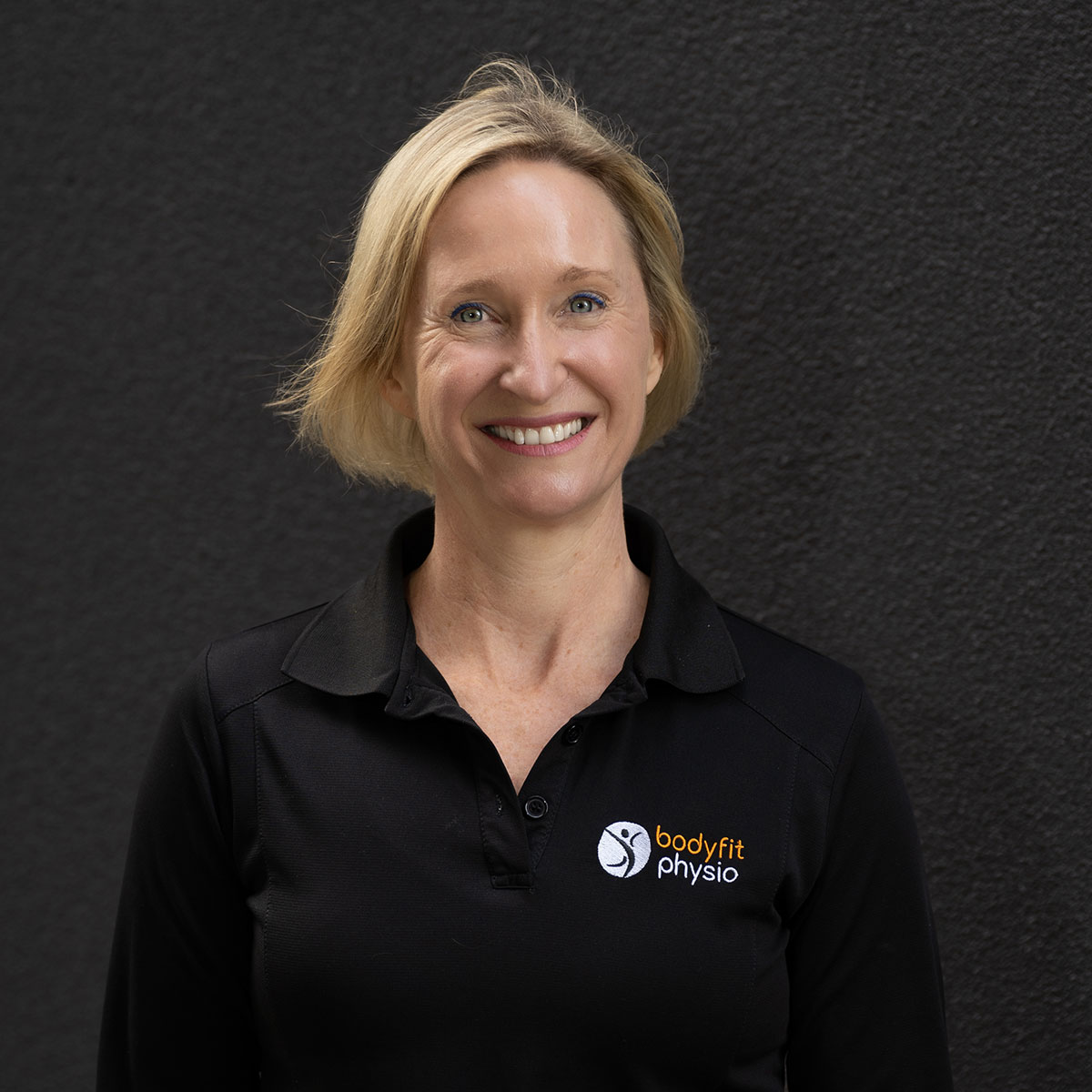
Juliet Hall (she/her)
Team leader. BSc (Physio)
Juliet loves working with her amazing team to provide high quality physiotherapy care across the clinic. Since graduating from Curtin University in Perth Juliet has gained more than 25 years of experience in all fields of physiotherapy. She finds her broad experience a valuable asset in providing a holistic approach to her client’s health. We love to be able to provide a space where everyone feels safe and cared for. Mums can bring their children to classes so that they can look after themselves. Please tell us what you need to assist you on your journey towards better health.
Juliet is passionate about advocacy for individuals or groups whose needs are not being met within the current system. She spearheaded facilitating the development and roll out of a lecture series for physiotherapists about hypermobility disorders. The Bodyfit Physio team is working to connect hypermobility practitioners through in person and online collaboration. The Bodyfit Paediatric team is working to increase awareness about Developmental Coordination Disorder (DCD), starting with maternal health nurses and Paediatricians, with a view to targeting kinders and schools in the future.
Juliet finds a combination of Pilates, strength training at the gym and taking time out every week just for her to be very beneficial for her own self-care. Juliet primarily works in conjunction with other physios in order to try and have the greatest impact. To book a time with Juliet and her staff please contact 9481 2348. Email Juliet.
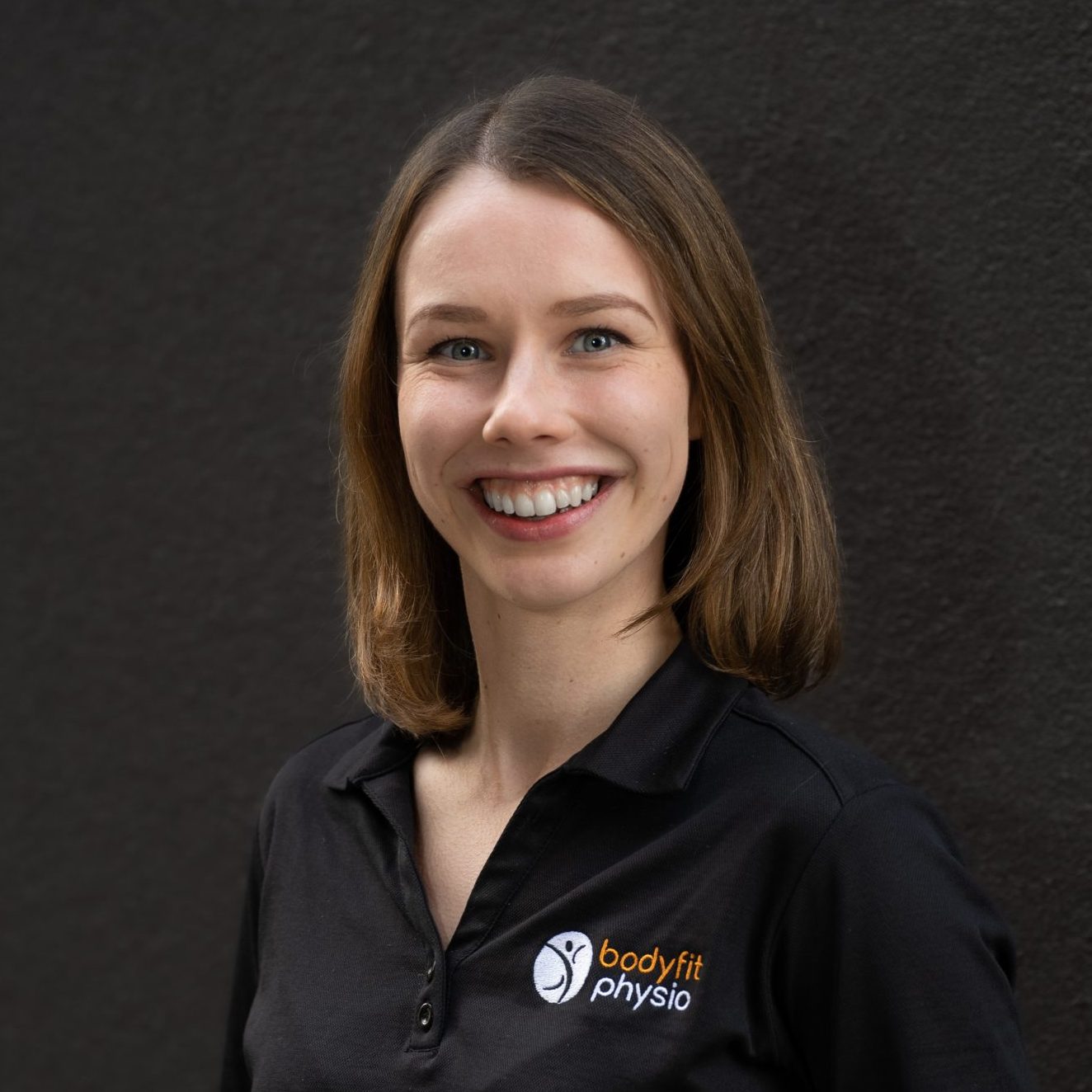
Emilija Olsen (she/her)
BAppSc, MPhysioPrac
Emilija graduated with a Masters in Physiotherapy Practice from La Trobe University. Emilija's love of classical ballet and keen interest in human biology and anatomy were the basis of her original decision to become a physiotherapist.
Emilija enjoys incorporating exercise, manual therapy and education to achieve the best possible outcomes for her patients. Emilija is passionate about assisting women on their pre and post-natal journeys. In 2020, she completed a course in the latest management of diastasis recti (abdominal separation). She enjoys working with mothers and expectant mothers to improve their quality of life and achieve their individual goals. Emilija has assisted mums with goals such as safely returning to exercise, increasing strength to be able to lift and carry their baby, reducing pain and improving pelvic floor and abdominal function.
Emilija always works with clients in their own preferred style. Many of her patients find clinical Pilates to be an effective way to achieve their goals. Emilija was selected to undertake a physiotherapy placement with the Australian Ballet during her final year of study. In addition to her 17 years of dance experience, this opportunity allowed her to enhance her knowledge and skills in the treatment of dancers.
Emilija likes treating all musculoskeletal injuries, but has a particular interest in pre and post-natal management, treating ankles, knees, back pain, neck pain, and dancers. She enjoys using Pilates in the prevention and treatment of injuries. Emilija is a dry needling certified practitioner. Emilija's name is pronounced "emma-lee-yah", but you are most welcome to call her Em. Email Emilija
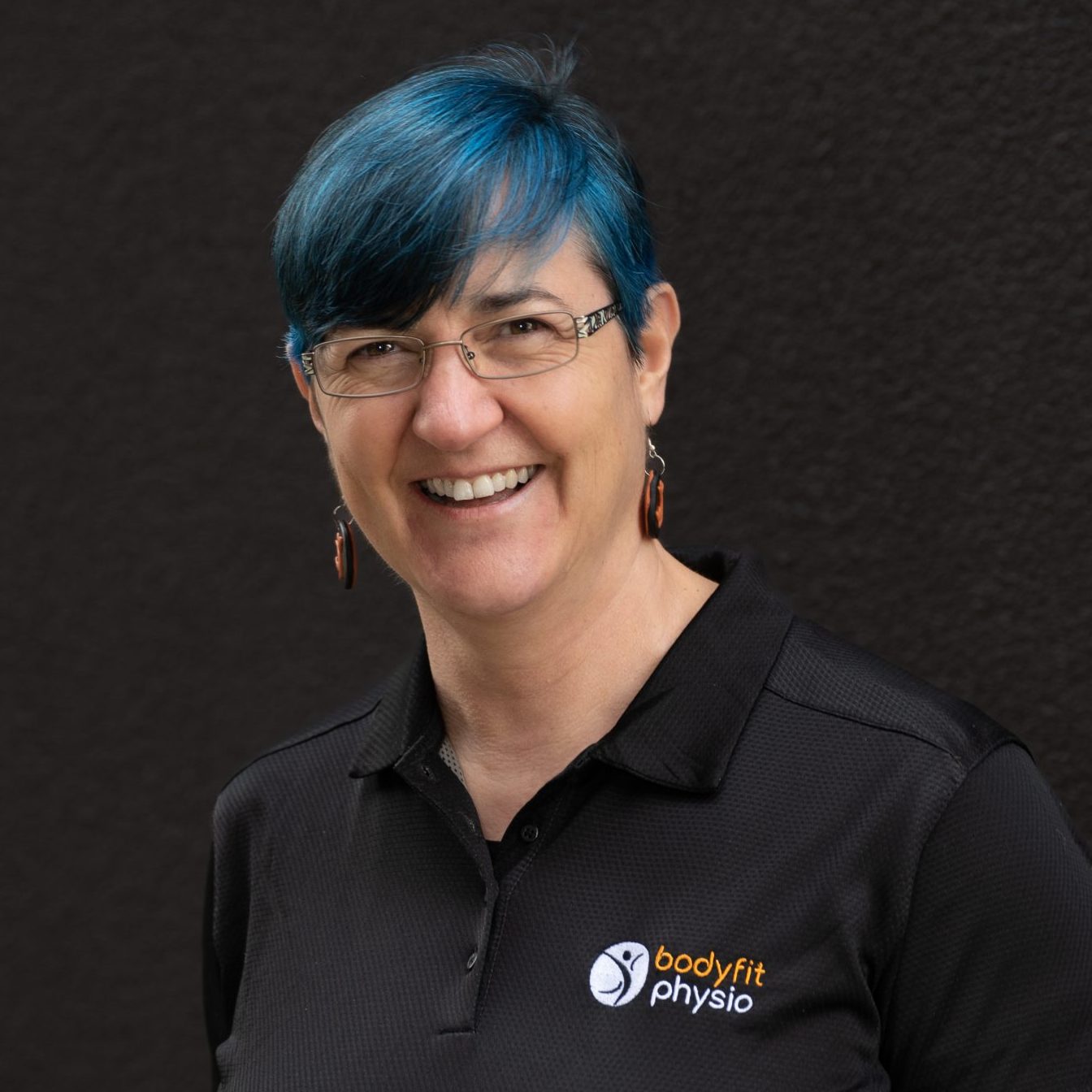
Terry Wesselink (she/her)
BSc (Physio); Post Grad Cert (Pelvic floor); Cert IV TAE
Terry has over 25 years of physiotherapy experience and has post graduate qualifications in Pelvic Health Physiotherapy from the University of Melbourne.
She is joining the Bodyfit team to share her extensive experience in pelvic health with the team and to support clients who need help with continence, pelvic floor, prostate or pregnancy related issues. She is also able to assist children who have bladder, bowel or toilet training issues.
Terry previously managed the Victorian Continence Resource Centre where she ran a busy NDIS Continence assessment clinic, and helped create new resources such as the Reclaim Your Core pelvic floor booklets and the www.goagainsttheflow.org.au website to bring pelvic health awareness to young women and teens.
She has delivered numerous toilet training and pelvic floor workshops to health professionals, schools and parents and is the author of a self-help book for people with incontinence, called WeeFree Women.
Terry enjoys assisting people with complex bladder, bowel and pelvic issues. With lived and family experience of Ehlers Danlos Syndrome, she has a specific interest in helping adults and children manage the impact of connective tissue disorders and other chronic conditions on pelvic health. On weekends you will find Terry in her garden watching her bees, listening to the birds or in a nearby café enjoying a cup of coffee.

Hilary McAdam (she/her)
BSc, MPhysioPrac
Hilary is a La Trobe University graduate with a Masters of Physiotherapy Practice. She also completed an undergraduate degree in the USA whilst competing as a Division I Track and Field athlete.
Through personal experience and bouts of injury as a runner, Hilary has found a passion in improving the well-being of others and has developed a growing interest in the biomechanics of the lower limb in running with an emphasis of preventing injuries and improving technique.
Hilary also enjoys exploring movement with kids and teens and uses fun, goal-oriented games and activities to support each child, whilst drawing from experience as a swimming teacher and running youth fitness and skill development classes. She has a special interest in helping children and teens manage the impact of connective tissue disorders and those with Development Coordination Disorder (DCD). Hilary is passionate about encouraging everyone to be active and engage with the world in a physical sense and is committed to listening to each person’s story and understanding their individual goals to develop a shared plan that everyone believes in and can take ownership of. Hilary uses a mixture of both hands on and exercise-based treatment methods and enjoys using Pilates in the prevention and treatment of injuries.
Outside of the clinic you’ll find her cycling everywhere, running, playing the piano, and enjoying live music with friends on the weekend.



